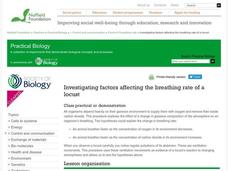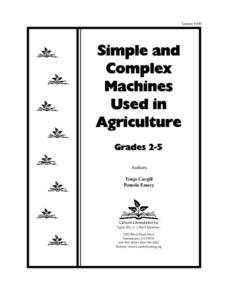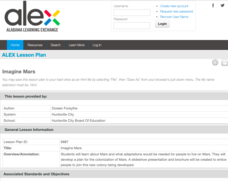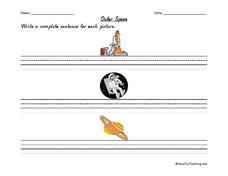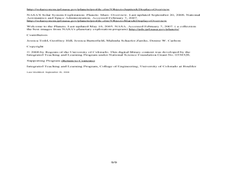University of Colorado
The Jovian Basketball Hoop
Can you listen to Jupiter on a simple radio? Turns out the answer is yes! The resource instructs scholars to build a simple radio to pick up the radio waves created when the charged particles from the sun hit Jupiter's magnetic...
Roald Dahl
Matilda - The Weekly Test
Readers take the main characters in Matilda and individually describe them through a mnemonic. To get there, group members create an acrostic poem describing the character they were given, and choose one of the words from the acrostic...
Science 4 Inquiry
The Impact of the Sun and Moon on Tides
In 150 BC, Seleucus of Seleucia theorized that the moon causes the tides. Scholars learn about what causes tides by studying the interactions of gravity between the sun, moon, and Earth. They use technology to formalize otherwise...
Nuffield Foundation
Investigating Factors Affecting the Breathing Rate of a Locust
Do animals breathe faster when given more oxygen or more carbon dioxide? Young scientists observe the respiration rates of locusts under a variety of gas concentrations to answer that very question. They collect data, analyze the...
Serendip
Understanding and Predicting Changes in Population Size – Exponential and Logistic Population Growth Models vs. Complex Reality
Salmonella poisoning impacts over 200,000 people in the United States each year. Scholars learn about the growth of these bacteria using multiple approaches. Then they apply the same growth calculations to endangered species and think...
Curated OER
The Great Planetary Debate
Learners' are given a research sheet to complete in small groups. They are to select a planet or moon to research using the Internet. With this research and their completed form, each group defends their planet or moon in a debate...
Curated OER
Solar Relatives
Students examine the solar system by creating a model representation. In this space science lesson, students research our solar system and the distances between planets. Students create a model solar system in their gymnasium and...
Curated OER
Climate Change
Students explore environmental care by researching the impact of human beings on our planet. For this climate change lesson, students utilize the Internet to read informational text about climate change and the effect it will have on our...
Curated OER
Planetary Orbits
Students explore space science by completing a solar system identification worksheet. In this planets lesson, students discuss the different planets in our star system and identify their traits. Students complete an orbital system...
Curated OER
Uncle Sam is Rich Enough to Give Us All a Farm:
Students examine websites and video clips to become familiar with tenets of the Homestead Act, challenges faced by settlers and misconceptions about settlers. They role-play colonists on the Planet XR-38 and make choices similar to...
Curated OER
Simple and Complex Machines Used In Agriculture
Students explore agriculture and the current technologies and research that continue to make Earth a viable planet. This four lessons unit introduce students to simple machines and the concepts of force and friction through a variety of...
Curated OER
Saudi Arabia
Students investigate the country of Saudi Arabia. They complete a Webquest, watch video clips, answer discussion questions, explore the Lonely Planet website, and read and evaluate newspaper articles about Saudi Arabia and foreign oil...
Curated OER
Nutrition in Space
Learners compare and contrast the process of dehydration with the processes of freezing and canning. They predict energy sources that may be accessible in the future in different environments such as the moon and planets, most notably Mars.
Curated OER
Hanging Around
Students explore weight by building a spring scale and observing how it responds to objects with different masses. Each team of students can make their own spring scale by following steps which are specifically outlined in the plan. As...
Alabama Learning Exchange (ALEX)
Imagine Mars
Middle schoolers research the planet of Mars using the Internet. They analyze the factors that would enable people to live on Mars and present a slideshow presentation and brochure about Mars.
Curated OER
Prefixes
Read out loud the stories Doctors Try to Separate Joined Twin Sisters, and New Planets Discovered. Focus on these words and the meanings of their prefixes: conjoined, extra-solar, telescopes, and universe. Then read information on the...
Curated OER
Scale Basketball
Students understand that a spreadsheet can be used to find the best scale to use in a model. They place the distances of the planets of the solar system to the Sun in one column of the spreadsheet. Students try different scales so that...
Curated OER
How Big Are Earth, Sun, and Moon?
Third graders draw what they believe is in space on a dry erase board. In groups, they are given a beaker half filled with water and they add a teaspoon of oil, observing the different layers that form. To end the lesson, they identify...
Curated OER
What is a River?
Young scholars study the various types of bodies of water: rivers, oceans, lakes and ponds. They observe models of each and then use clues to discuss how they are alike and different. They imagine they have found a new planet and draw...
Curated OER
Extreme Elevations
In this geography worksheet, 5th graders work in groups in order to locate and graph mountains found on all the continents of planet earth.
Curated OER
Outer Space
In this space worksheet, students write a sentence for each picture. The pictures show a space shuttle, an astronaut, and a planet.
Curated OER
Mars and Jupiter
Students learn about how engineers help us to know about Mars and Jupiter. In this Mars and Jupiter lesson plan, students are introduced to the telescope, deep space antennas, spacecraft, and planetary rovers that engineers designed to...
Curated OER
Water, Glorious Water
Young scholars identify the various uses of water. In this water conservation lesson, students read the book, The Drop In My Drink: The Story of Water On Our Planet and write down their favorite uses of water. Young scholars illustrate...
Alabama Learning Exchange
Scaling Down the Solar System
Learners work collaboratively to gain a better understanding of the vastness of space by scaling down the solar system. They measure by inches, gain an understanding of space, and model the distances of the planets from the sun.





